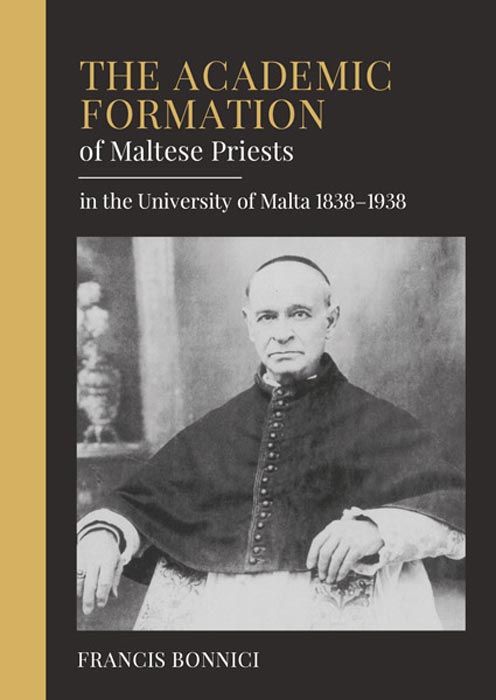-
-
The Academic formation of priests in the University of Malta 1838-1938, author Francis Bonnici, knows its origin to “100 years ago: Exhibition to be conferred on best student in Theology” in The Times of Malta of 21 February 2000.
Research work was carried out in the Archives of Malta (the National Library, the University Melitensia and Archives, the National Archives in Rabat, which hosts the documentation of the English period and the Archives of the Cathedral Church). The research went further in Rome at the Gregorian University, the San Alberto Library of the Carmelite Fathers and the Dominicans’ University of St Thomas Aquinas.
The research focused on the academic formation of priests in the period between 1838 and 1938 when priests in the University of Malta graduated Doctors of Divinity. Before joining the Faculties of Theology, Law and Medicine the students were required to graduate in Arts. Students who intended to follow the course of Theology had to make a decision regarding their vocation to the priesthood.
-

-
-
The Academic formation of priests in the University of Malta 1838-1938 studied the findings of this research with the context of the history of the Church, which showed great care throughout the centuries towards the academic formation of priests. The Church instituted the Cathedral schools, the Universities and the Seminary wherein students studying for the priests followed courses in Grammar, Sciences, Philosophy and Theology. The Church in Malta followed suit in the solicitude of the Universal Church to prepare future priests for teaching the Catholic faith, the spiritual life and the pastoral means for the salvation of souls. The Seminary in Malta opened its doors in 1703.
Research work looked for the institutes which catered for the education of the local clergy, first and foremost the Cathedral Church which established a salary for the Magister who taught young people in preparation for the priesthood. Religious Orders, the Jesuits, the Dominicans, the Augustinians, the Franciscan Conventuals, the Carmelites and the Discalced Carmelites all opened schools in Malta for the education of the lay people especially those going to the priesthood. The Jesuits College became the University of Malta 250 years ago, in 1769 on the initiative of Grandmaster Emmanuel Pinto. The Faculty of Theology in the Jesuits College found its place in the University and it is there even today.
In the English period, Governor Maitland was not enthusiastic about the University because of its low standards. A commission for the reform of the University began reforming the structure and the curriculum of studies in 1822. Governor Bouverie opened the scholastic year of the University in 1839 with the Fundamental Statute formulated by Sir Gavinus Ignatius Bonavita.
Research works found the names of the students who followed the course of Theology between 1800 and 1833 and between 1839 and 1938. Forty-four students in the former period and 181 in the latter passed their final examinations graduating in Theology.
However, the Faculty of theology was teaching only Dogmatic and Moral Theology. The Exhibition or scholarship which was decided upon by the Council of Government in 1900 guaranteed the Frist students of the course of Theology to study in Rome. The eleven students who were Frist students between 1903 and 1938 together with other students who following courses in Philosophy, Holy Scripture, Canon Law and History of Church in the Gregorian University brought about the necessary reform of the Faculty of Theology.
A study in the documentation of the Secretariat of State of the Vatican regarding the diplomatic relations between the Holy See and the British Government in Malta (1932 -1938) found that the Faculty of Theology in Malta was able to raise its standards and increase its subjects of Theology in accordance with the Apostolic Constitution Deus Scientiarum Dominus.
The author of The Academic formation of priests in the University of Malta 1838-1938, Fr Francis Bonnici, is pleased to receive information about the priests who graduated in the University of Malta. He can be contacted on [email protected] or +39 3393472163. However, the book provides ample information about these priests especially regarding their pastoral and cultural activities in Malta and in the Church.





